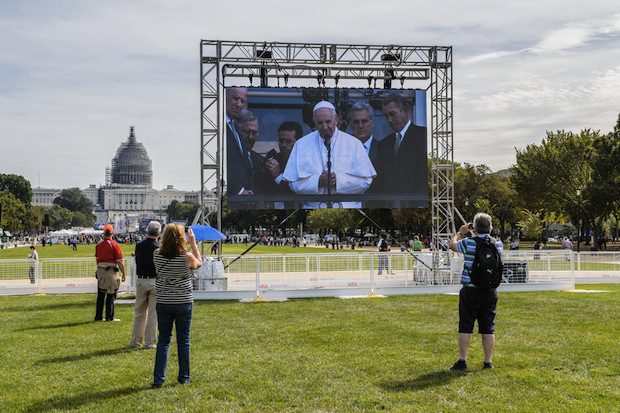‘To Hell With Congressmen’

Here’s a very enjoyable interview in the Jesuit magazine America with R.R. Reno, editor of First Things. Below, my favorite parts.
On Pope Francis skipping a Congressional lunch:
As for passing on lunch with the congressmen and going to the homeless shelter, all I can say is good for him. You know, I don’t know if you can print it, but to hell with congressmen. I think one of his most powerful witnesses is his refusal to let the hierarchies of the world determine his ministry and the spiritual attention he gives to others. I think that’s a very powerful witness and one that I’m very grateful for.
On Francis as a symbol of Catholic postconciliar fragmentation:
He’s really the first pope who came of age in the era of and immediately after the Second Vatican Council. The church since the Council has had a fragmented, disordered language and mind. He is not a synthetic, systematic thinker. Instead, he’s a poet of the faith, I would say, rather than a philosopher of the faith. So he often manifests this kind of fragmentation and lack of coherence in the life of the church. In that sense, the weakness is that he’s a mirror of the church in its own fragmented mind in the wake of the Second Vatican Council.
More:
As editor of an ecumenical journal founded by the late Father Richard John Neuhaus, a leading theological spokesman for the Religious Right, where do you find yourself most in harmony with Pope Francis?
Clearly, the primacy of our life in Christ over all things resonates. Secondly, I share with Pope Francis a dissatisfaction with the power elite of the contemporary West, which I think is ideologically oriented toward perpetuating its own power even though it calls itself progressive. Most American liberals think the pope is criticizing conservatism, but they are—along with their European counterparts—in fact the dominant outlook in the rich world. So when the pope is criticizing the global system, he’s criticizing the system they run. It’s not a system being run by evangelical pastors in Texas. It’s a system being run by Ivy League graduates in New York, Los Angeles, and Washington—and they are not readers of “First Things.”
As a political conservative, where do you find yourself most in tension with Francis?
I think Francis accepts uncritically the social justice movement in the Catholic Church, which, although often well-intentioned, adopts the intellectual and moral framework of secular progressivism—which is, I think, anti-metaphysical and easily manipulated by the powerful to serve their own ends. Multiculturalism is a technology for managing and manipulating people. I find the same outlook has a therapeutic view of the human condition. So I’m frustrated by Pope Francis’ use of that social justice vocabulary, which I think is easily co-opted by the rich secular world.
Let me put it this way: To make a claim about Natural Law is the most heretical thing you can do at a contemporary secular university, in the technocracy of today. I wish this papacy was more aware of the true nature of what we’re up against in the 21st century. As a conservative, I’m not opposed to the pope’s criticisms of global capitalism. It strikes me that global capitalism doesn’t need to be defended because it’s the only system we have. So criticizing it and trying to humanize it should be the goal of any morally serious person today, whether they’re conservative or liberal. We just disagree in debate about how best to humanize it.
Good interview. Read the whole thing.
I find that Reno’s “to hell with Congressmen” resonates with me, not because I dislike Congressmen (I do not), but because so much of what is wrong with American Christianity is our infatuation with power in this world. To the extent that Pope Francis shows us the power of antipolitical politics, he is an icon for all of us Christians.
Subscribe for as little as $5/mo to start commenting on Rod’s blog.